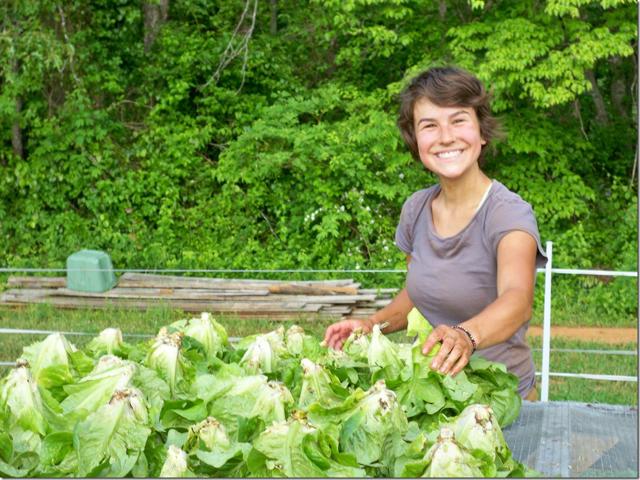- Lettuce provide for each other: Blake Everhart prepares a table of greens being sent to Trinity of Fairview’s food pantry. photo by Cinthia Milner
- Lettuce provide for each other: Blake Everhart prepares a table of greens being sent to Trinity of Fairview’s food pantry. photo by Cinthia Milner
Ten years ago, my garden overflowed with tomatoes, potatoes, zucchini, eggplant, beets, carrots, spinach and Brussels sprouts. These days, my attention has turned to the perennial beds and shrubs, and my cover crop of rye has simply been pushed over a bit so I could stick a few peppers and tomato plants in the ground. My boys (two massive eating machines) are grown and mostly gone, and all those vegetables would never get eaten. It seems silly to grow them for just one person — me.
The Lord's Acre, a nonprofit garden in Fairview, has a broader vision: serving God by helping their community. Besides providing food, notes manager Susan Sides, "I want it to inspire." Last year, she informs me, one in six Western North Carolina residents used a food bank, and most of the donations these vital institutions receive are canned or processed foods. What’s missing is garden-fresh vegetables, which is where The Lord's Acre comes in. Their goal is to provide not the seconds or the leftovers, but the very best organic produce. What you or I might keep for ourselves, The Lord's Acre grows and gives away, "respecting the dignity and integrity of each person who counts on the food pantries," Sides explains.
This worthy undertaking has its own unique history. During the tough years of the 1930s, the Farmers Federation — an agricultural cooperative started in 1920 by Jim McClure of Hickory Nut Gap Farm and other local farmers — launched a project called The Lord's Acre. The idea came from the biblical word tithe (which literally means “10 percent”). Participating farmers agreed to donate an acre’s worth of produce to feed others. The program took off, and 11 years later, it had grown to include more than 1,000 churches spanning 20 denominations, with gardens in India, China, Brazil, Mexico, Japan and across the U.S. With the return of prosperity, the decentralized project fizzled, though pockets of it remain.
Inspired by their example, however, some pretty knowledgeable gardeners came together in Fairview in 2009, borrowing the name for their community garden. Sides, a former researcher and writer for Mother Earth News, wrote The Healthy Garden Handbook. Pat Stone, a former garden editor for Mother Earth News who’s now the editor of GreenPrints, serves on The Lord’s Acre’s board. And with the help of quite a few volunteers, this dedicated team is turning a dream into reality.
Last year, the half-acre parcel, on loan from an anonymous supporter, provided nearly 6 tons of fresh produce to groups such as the Fairview Food Pantry, Trinity of Fairview, Helpmate and the newly opened Welcome Table. Volunteers, ranging from individuals to church and school groups, pitched in more than 2,500 hours of work. All of them desire to help, and some are also looking to learn.
With its wide raised rows, cover crops, demonstration plot, children's garden and classes (taught by Susan and other experts), the educational project offers a comprehensive good-gardening experience.
Meanwhile, the vision continues to grow. The board wants to buy five adjacent acres to accommodate fruit and nut trees, berries, mushroom cultivation, an amphitheater and more field space.
"But this is not just a garden," stresses Sides. "It’s a community. Here, I visit and work alongside people I wouldn't have a chance to talk to in my normal day. We'd like this place to become a real beacon for Fairview, a place that addresses the topics of food and food security. It’s a door: a door that opens other doors into people's lives."
The Lord's Acre wants to teach about food — not just how to grow it, but what fresh food tastes like and how to cook it. They want to promote community dialogue about local food security. They want to be a model, both for their own community and for others who might emulate them.
The garden sits on a hillside in Fairview, behind a white wooden cross. It’s an inspiring spot, and as I leave, I contemplate my own garden and the way its size reflects my family’s expansion and contraction. I’m a horticulturalist with a lifetime of experience: Why hadn't I thought of keeping my own garden growing to help others in need? I guess I just needed to be inspired.
— Cinthia Milner gardens in Leicester.






Before you comment
The comments section is here to provide a platform for civil dialogue on the issues we face together as a local community. Xpress is committed to offering this platform for all voices, but when the tone of the discussion gets nasty or strays off topic, we believe many people choose not to participate. Xpress editors are determined to moderate comments to ensure a constructive interchange is maintained. All comments judged not to be in keeping with the spirit of civil discourse will be removed and repeat violators will be banned. See here for our terms of service. Thank you for being part of this effort to promote respectful discussion.